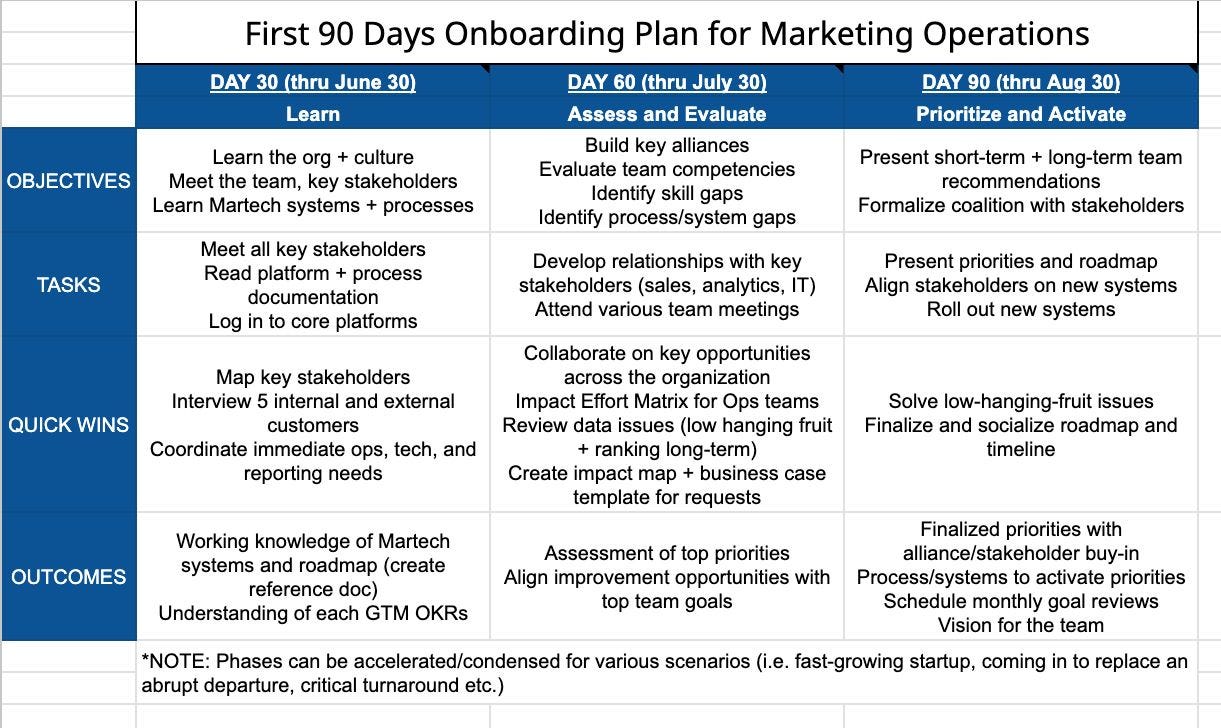90-day plan for marketing ops, out-of-the-box thinking, having confidence and more
In this edition:
90-Day Onboarding Plan for Marketing Operations
Out of the Box Questions to Change Your Operations
The Difference Confidence Makes in Your Work
For Paid Subscribers: The Soft Skills You Need for Marketing Ops Success
Level-up Your Revops Team: Revlitix leverages pattern recognition and proactive diagnostics to help marketing and sales teams spot money-making opportunities hidden in plain sight and fix revenue leakages in real-time. Take a Product Tour and Get a $100 Gift Card.
Check out the podcast: Darrell and Jeff record a weekly ops podcast called “Revenue Rhthyms”- listen here.
Friends of the Newsletter: The Humans of Martech podcast is one of my favorites. Check them out on Spotify or Apple podcasts.
90-Day Onboarding Plan for Marketing Operations
The first 90 days are tricky - go too fast and you might focus on the wrong problems. Go too slow and people will think you are deadweight.
My mentor gave me this template for succeeding in the first 90 days of a marketing ops role; here is the breakdown.
Two keys here:
Key Point 1: We focus on quick wins and outcomes - this way you aren’t sitting around for 90 days. Momentum is important.
Key Point 2: Don’t fill out this template by yourself. Show early drafts to your boss, peers, and anyone else who might be impacted. You’ll be surprised by what you learn.
Follow these steps to get ahead in your first 90 days; you won’t regret it.
Out of the Box Questions to Change Your Marketing Ops
Here are 7 questions that will change the way you work in marketing:
1 - What would happen if you stopped doing 50% of the tasks in your day?
Much of work is "legacy tasks" that we do because we've always done it that way. Starting fresh can dramatically improve your results and return on energy.
2 - Which parts of your work do leaders not understand? Why?
If no one knows what you are working on, then it is time for serious education or goal realignment. Often, both are needed.
3 - Where did you get your current list of priorities? Are you doing something because a third party said you "should"?
This is the danger of "best practices." Sometimes, they don't apply, and sometimes, they encourage every company to look and sound the same.
4 - What investments would you make if you had double your current budget? How would you make it work if you only had half of your current budget?
If you don't know what you would do with additional resources, it's unlikely that you will get them. Conversely, constraint breeds innovation, and it's a good exercise to think through how you would be scrappy if you had less.
5 - If you had no meetings for a week, what three things would you work on? Why?
A few key things can have a big impact. Once you know them, carve out blocks of time to do them.
6 - How would a world-class consultant approach the problem you are facing now?
It can be difficult to look at your work objectively. Try imagining yourself as an external consultant, using frameworks to define problems properly and offer innovative solutions.
7 - What new skill could you develop in the next 90 days?
You've probably gotten really good at something in the last year, just out of happenstance. You can do the same thing in the next 3 months, but this time be intentional about it.
Confidence in Yourself
"You're terrible at marketing, aren't you?" my boss said after reviewing my work.
"Yes...sorry about that," I said, looking down.
My work worsened, especially because I doubted everything I did.
I eventually asked to be transferred to a sales support role because I believed I couldn't handle marketing work.
A year passed - I was in another support role at a different company, and I was invited to a marketing team meeting to listen in.
The marketing team was stumped with a bounce rate problem on their landing pages.
"If you simplify the messaging and include a testimonial, the conversion rate should improve," I said without thinking.
Everyone turned to look at me, impressed with my solution.
Slowly but surely, I started taking on marketing projects for that team. I eventually moved into a full-time marketing role, and then into management.
My confidence grew with each new challenge.
Fast-forward to today: I’ve authored a book on Martech, been paid to give keynotes internationally, and launched an online training course for marketers worldwide.
I'm often asked how I'm able to do all of these things.
I confidently answer: "It's because I am good at this."
Keep reading with a 7-day free trial
Subscribe to The Marketing Operations Leader to keep reading this post and get 7 days of free access to the full post archives.







